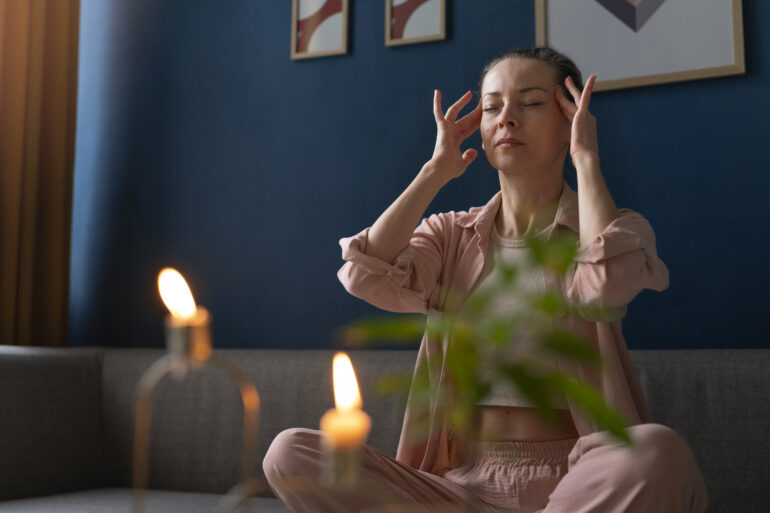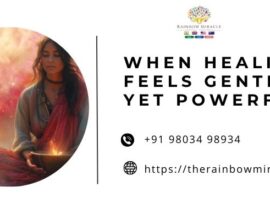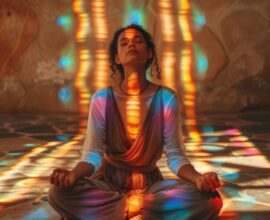In today’s fast-paced world, it’s almost impossible to escape stress. Whether it’s the endless notifications, personal struggles, or societal pressure, the mind rarely finds silence. But what if healing didn’t always come from pills or therapy sessions alone? What if energy—subtle yet powerful—could restore balance from within? That’s exactly where Reiki in Improving Mental Health steps in as a gentle yet transformative solution.
Understanding Reiki: The Energy Behind the Calm
Reiki, a Japanese technique for stress reduction and relaxation, is based on the concept that life force energy flows through us. When this energy is blocked or imbalanced, we feel physical or emotional distress. Reiki healing works by channeling this universal energy through the practitioner’s hands to the recipient, restoring energetic harmony and emotional peace.
For those struggling with anxiety or depression, Reiki acts like a quiet whisper to the nervous system—inviting it to relax, release tension, and remember what peace feels like.
How Reiki Helps Ease Anxiety and Depression
Unlike conventional treatments that often target symptoms, Reiki works on a deeper energetic level. It’s not about “fixing” you but rather rebalancing your natural energy flow so your body and mind can heal themselves. Here’s how Reiki supports emotional well-being:
- Balances the nervous system: Reiki calms the sympathetic nervous system, reducing the fight-or-flight response that fuels anxiety and panic.
- Releases emotional blockages: Stored emotions—grief, fear, guilt—can create energetic stagnation. Reiki gently dissolves these blocks, allowing emotions to flow freely.
- Improves sleep and relaxation: Many recipients report better sleep and a sense of deep calm after sessions, crucial for those with depression or chronic stress.
- Boosts self-awareness: Reiki brings buried emotions to the surface, helping individuals understand and heal from their emotional roots.
The Science Meets Spirit Connection
Although Reiki originates from ancient practices, modern research is catching up. According to studies published by the National Center for Biotechnology Information (NCBI), energy therapies like Reiki can help reduce anxiety and depression symptoms by lowering heart rate, blood pressure, and cortisol levels. While it doesn’t replace professional medical care, it can complement it beautifully—like a soothing melody playing alongside structured treatment.
What to Expect in a Reiki Healing Session
If you’ve never experienced Reiki before, imagine lying down fully clothed in a peaceful space while the practitioner lightly places their hands on or just above your body. You might feel warmth, tingling, or even waves of calm washing over you. Each session typically lasts 45–60 minutes, but the effects can linger for days—often bringing emotional clarity and lightness.
Online Reiki Healing: Comfort Meets Connection
One of the most beautiful aspects of Reiki is that energy transcends distance. Online Reiki healing sessions have become increasingly popular, especially for those managing anxiety from the comfort of home. Practitioners connect energetically through intention and focus, allowing healing energy to reach clients no matter where they are. It’s a modern bridge between spirituality and technology.
Signs Reiki May Be Right for You
Consider Reiki healing if you:
- Struggle with chronic stress, fear, or sadness
- Feel emotionally drained or mentally cluttered
- Seek holistic support alongside therapy or medication
- Desire inner peace without side effects
Real-Life Example: From Overwhelm to Inner Balance
A young professional once described her Reiki journey as “finally exhaling after years of holding my breath.” After just a few sessions, her racing thoughts slowed, her sleep improved, and she began viewing challenges with calm clarity. Reiki didn’t erase her struggles—it simply shifted her energy enough to face them with strength.
FAQs on Reiki Healing for Anxiety and Depression
1. How many Reiki sessions are needed to see results?
It varies from person to person. Some feel lighter after one session, while others notice deeper emotional release after 3–5 sessions. Consistency amplifies results.
2. Can Reiki replace therapy or medication?
No, Reiki is a complementary therapy. It works best alongside conventional treatment plans, supporting emotional healing while you continue professional care.
3. Is Reiki safe for everyone?
Absolutely. Reiki is gentle, non-invasive, and suitable for people of all ages, including children and seniors. It involves no physical manipulation or harmful side effects.
4. Can online Reiki be as effective as in-person sessions?
Yes. Energy is not limited by distance. Many clients report the same calm, warmth, and healing sensations from remote sessions as they do in person.
Final Thoughts
In a world that rarely pauses, Reiki offers a sacred pause—a chance to reconnect, breathe, and remember your natural state of balance. For those navigating anxiety or depression, this gentle form of energy healing can become an anchor of peace amid emotional storms. Healing, after all, starts with the willingness to receive light.





